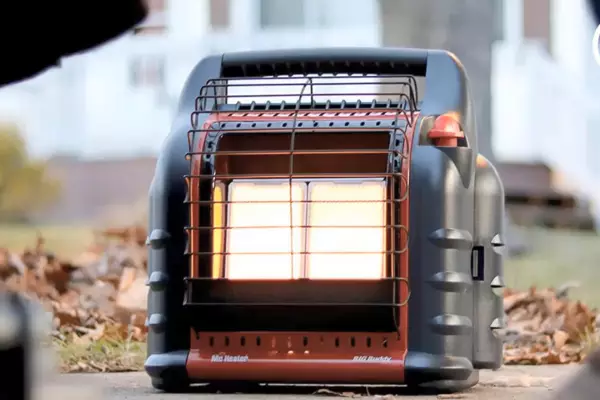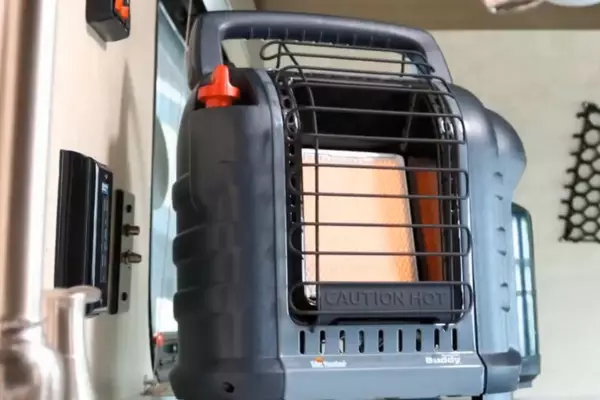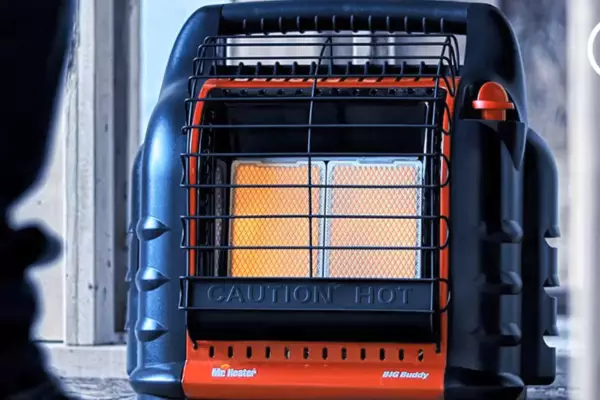Propane heaters have made a mark for themselves in the heating market. They are known for their efficiency and warmth, proving to be reliable companions during cold spells. These heaters use propane, a type of liquefied petroleum gas, to generate heat.
Indoor usage of these heaters is a topic that sparks questions about safety and proper operation. Are propane heaters safe to use indoors? Yes, but under the condition that specific safety guidelines are adhered to and adequate ventilation is ensured.
The safety of propane heaters isn’t a black-and-white subject. While they can be safe, there are also certain risks involved. A thorough understanding of these risks is crucial for safe indoor operation.
Contents
Indoor Usage of Propane Heaters
The charm of using a propane heater indoors lies in the convenience, comfort, and efficiency it offers. However, this practice comes with a caveat of certain safety protocols that must be diligently followed.

Considerations for Indoor Use
When using a propane heater indoors, there are several aspects to keep in mind:
- Proper Placement: Placement of the heater is important. It needs to be placed on a flat surface and kept away from areas that are prone to high foot traffic or pets. This reduces the chances of it tipping over and causing an accident.
- Space Clearance: Keep combustible materials, such as curtains, furniture, or paper products, at least 3 feet away from the heater to minimize the risk of fires.
- Room Size: The size of the room matters. A room that’s too small can lead to rapid accumulation of carbon monoxide.
- Ventilation: Adequate ventilation is crucial to prevent the buildup of harmful gases.
Precautions for Indoor Operation
Indoor operation of a propane heater requires certain precautions to ensure safety:
- Avoid Unattended Operation: Never leave a propane heater unattended or use it while sleeping. If the heater malfunctions or a problem arises, it’s essential someone is there to react.
- Monitor CO Levels: Carbon monoxide is a deadly gas that’s released when propane burns incompletely. Therefore, it’s important to monitor CO levels in your home when using a propane heater.
- Regular Inspections: Frequent inspections of the heater can help identify potential issues before they escalate. Look for visible signs of wear and tear, such as cracks or rust.
Safety Concerns with Propane Heaters
The prospect of using a propane heater indoors often brings forth concerns about safety. Propane heaters, like any other heating equipment, come with certain inherent risks that need to be managed effectively.
Inherent Risks of Propane Heaters
The primary risks associated with propane heaters are:
- Fire Hazards: As propane heaters generate a lot of heat, they can ignite any combustible materials left too close to them.
- Carbon Monoxide Poisoning: Propane heaters can emit carbon monoxide during incomplete combustion. This colorless, odorless gas can cause serious health issues or even death when inhaled in high concentrations.
- Gas Leaks: Propane is a flammable gas. If a leak occurs, it can result in an explosion or fire if ignited.
Safety Features in Modern Propane Heaters
To mitigate these risks, modern propane heaters come equipped with several safety features:
- Tip-Over Protection: This feature automatically shuts off the heater if it’s accidentally knocked over, preventing potential fires.
- Overheat Protection: If the heater’s internal components reach a potentially dangerous temperature, this feature will automatically shut off the heater.
- Oxygen Depletion Sensors: These sensors monitor the level of oxygen in the room. If oxygen levels drop below a certain threshold, the heater automatically turns off.

Carbon Monoxide and Propane Heaters
One of the main safety concerns when using propane heaters indoors is the potential emission of carbon monoxide, a dangerous gas that can lead to serious health complications and even death if not detected in time.
CO Emission by Propane Heaters
Carbon monoxide (CO) is a byproduct of burning propane. Under normal circumstances, the amount of CO produced is minimal and does not pose a significant threat. However, if the propane does not burn completely due to issues such as lack of oxygen or a malfunctioning burner, the heater may produce harmful levels of CO.
CO Detectors and Their Importance
Given the potential threat of CO poisoning, it’s important to install carbon monoxide detectors in your home. These devices can detect dangerous levels of CO in the air and sound an alarm, giving you time to evacuate the premises and take necessary action.
A CO detector should be installed on each level of your home and outside sleeping areas. The batteries should be checked regularly and replaced as per the manufacturer’s instructions.
Propane Heater Maintenance
Maintaining your propane heater properly is key to ensuring its safe operation and prolonging its lifespan. Regular maintenance can help identify potential problems early and prevent them from escalating.
Regular Checks for Safe Operation
Conducting regular checks on your propane heater can go a long way in preventing potential issues:
- Visual Inspection: Before each use, visually inspect the heater for any visible signs of damage, such as cracks, rust, or leaks.
- Check the Hose: Ensure that the hose connecting the propane tank to the heater is intact and free from leaks or damage.
- Check the Flame: The flame of a propane heater should be blue. If the flame is yellow or orange, it indicates that the propane is not burning completely and could result in excess CO production.
Professional Inspection and Services
While regular self-checks are important, it’s equally vital to have your heater professionally inspected and serviced. Professionals have the necessary expertise and tools to conduct a thorough inspection and perform required maintenance tasks.
This might include cleaning the heater, checking for gas leaks, ensuring the correct pressure is maintained, and verifying that safety features are working as intended.
Propane Heaters vs Other Heaters
When it comes to indoor heating, there are numerous options available. How does a propane heater stack up against other heaters, such as electric or natural gas heaters? Let’s delve into this comparison.
Cost and Efficiency
Comparing propane heaters with other heaters necessitates an evaluation of both cost and efficiency.
- Propane Heaters: Propane heaters often offer a higher heat output per unit of fuel compared to other types of heaters, making them an efficient choice. While the cost of propane can vary, it is often cheaper than electricity, making propane heaters an economical option for many households.
- Electric Heaters: Electric heaters can be less efficient than propane heaters and often cost more to run. However, they come with fewer safety concerns, as they do not produce any harmful gases and do not require ventilation.
- Natural Gas Heaters: Natural gas heaters share many of the advantages and drawbacks of propane heaters. They are efficient and generally cost less to run than electric heaters. However, like propane heaters, they pose a risk of carbon monoxide poisoning and require adequate ventilation.

Installation and Maintenance
The convenience of installation and ongoing maintenance are important factors when considering the type of heater to use.
- Propane Heaters: Propane heaters require a propane source, which can be a bit more complex to install compared to electric heaters. The need for regular checks for leaks and carbon monoxide emissions also means more maintenance is required.
- Electric Heaters: Electric heaters are generally easier to install and maintain. As long as you have a power outlet, you can plug in an electric heater and start using it. They require less maintenance as there’s no risk of gas leaks or CO emissions.
- Natural Gas Heaters: Installation of a natural gas heater often requires professional assistance, as it involves connection to a gas line. Regular inspections are necessary to prevent gas leaks and ensure proper ventilation.
Legal Regulations and Propane Heaters
Various laws and regulations govern the use of propane heaters indoors. These regulations are designed to ensure the safe usage of these devices and protect homeowners.
General Regulations
General regulations surrounding the use of propane heaters usually involve mandatory safety features, permissible emission levels, and standards for safe installation and operation. For instance, most jurisdictions require propane heaters to have safety features such as tip-over protection and oxygen depletion sensors.
Regional Variations
Legal regulations can vary significantly depending on the region. Some areas may have stricter rules regarding indoor air quality and emissions, while others may focus more on installation and safety features. Always consult local regulations or a professional before installing a propane heater indoors.
Selecting a Safe Indoor Propane Heater
Safety Standards and Certifications
Look for heaters that meet safety standards and have safety certifications. A heater with an automatic shutoff feature and a built-in oxygen depletion sensor is a good choice.
Crucial Features to Look For
Select a propane heater with safety features like tip-over protection and overheat protection. Always choose a heater that fits the size of your room.
Proper Ventilation: A Key Safety Factor
Importance of Ventilation
Ventilation is key to avoiding carbon monoxide build-up. Make sure to have sufficient fresh air entering the room where the heater is operating.
Tips for Ensuring Adequate Ventilation
Open a window or door to let fresh air in. Avoid using a propane heater in a completely sealed room.
Emergency Measures with Propane Heaters
Steps for Propane Leak Detection
If you smell a strong, unpleasant odor, it might be a propane leak. Turn off the heater and open windows and doors to let fresh air in.
Emergency Actions in Case of Leak or CO Detection
In case of a suspected leak or high CO levels, evacuate everyone from the home. Call professionals to inspect and fix the issue before using the heater again.
Frequently Asked Questions
Are Propane Heaters Safe to Use Indoors?
Propane heaters can be used safely indoors if proper precautions are taken. These include using heaters designed for indoor use, ensuring adequate ventilation, keeping the heater away from flammable materials, and never leaving the heater unattended.
Do Propane Heaters Produce Carbon Monoxide?
Propane heaters can produce carbon monoxide (CO) during incomplete combustion. Therefore, it’s important to have a CO detector installed when using a propane heater indoors.
What Should I Do If I Smell Gas from My Propane Heater?
If you smell gas, it may indicate a leak. Immediately turn off the heater, open the windows to ventilate the room, evacuate the premises, and call a professional or your local gas company.
Conclusion
Using a propane heater indoors can offer efficient and cost-effective heating. However, it comes with specific safety precautions that must be observed. The potential risks, such as fire hazards and carbon monoxide poisoning, can be mitigated by taking safety measures and maintaining the heater properly.
Propane heaters have their own strengths and weaknesses compared to other heaters. The choice between propane, electric, or natural gas heaters depends on factors such as cost, efficiency, installation requirements, and safety considerations.
Legal regulations surrounding propane heaters emphasize the importance of safety features, emissions, and proper installation. Understanding these rules is critical before choosing to use a propane heater indoors. Always remember, safety should never be compromised when seeking comfort and warmth in your indoor spaces.

